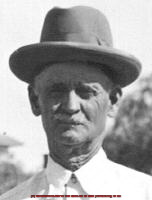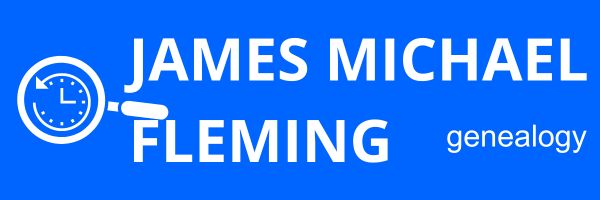
He was born 40 years after his grandfather, Thomas Kessey, arrived in Australia as a convict aboard the General Stewart and he was the first Australian born with the surname "Kessey" (because his uncles and aunts were born as "Casey"). The "K" spelling for the surname was adopted by the family from the time of James' parents' (John Kessey and Mary Ann Hanrahan) marriage in 1857.
When James was six years old, his two oldest uncles were convicted of robbery under arms and sentenced to ten years hard labour to be served at Darlinghurst Gaol and Cockatoo Island. The Kessey family was associated by marriage to a number of other local families whose members ran foul of the law and spent time in gaol. Property crime was rife in the area. His own father, John Kessey, was convicted of cattle stealing and gaolled for 3 years when James was twelve years old.
James' mother, Mary Ann Hanrahan was expecting her sixth child when her husband was gaolled. She could expect no help from her husband's family because two of his brothers were already in gaol and her father-in-law had his hands full supporting his own large family. She was fortunate, however, that she had two strong sons to help her with 5-year-old twins John and Thomas, toddler Elizabeth and the new baby, Emily. No doubt, she also relied very heavily on her mother, sister and brothers.
It seems likely that Mary Ann steered her children away from the Kessey clan because of its association with crime. It would have been easy for her oldest son to be led astray by his father and uncles but, in fact, he went the other way to become a solid citizen and pillar of the community.
At the age of 32, James married Mary Jane Press at Rockley. Her father, David Press, had emigrated to Australia with his parents on the Una in 1849 from Wiveliscombe, Somerset.
The first child of the marriage, Mary Grace, was born in 1891 with the second, James Alexander (known as Harold) following two years later. They were known by their second names throughout their lives. Eight more children followed: Beatrice b.1895, Emily Bernadette ("Bern") b.1896, Philomena b.1898, Joseph Aloysius b.1899, John Horace ("Horace") b.1902, Halvar Roy b.1905, Jean Alice Columbia b.1907 and Hilton David b.1909.
In 1914 there was a scandal involving Mary Jane Kessey and the mine manager, Walter Henry Martin. James Kessey sued his wife for divorce and named Martin as co-respondent. The divorce was granted and Martin was ordered to pay James Kessey £500. With their mother gone, the younger children were taken in by their older sisters who were, ironically, married to Walter Martin's sons.
Following this upheaval, James and his family moved to Orange and ran a butcher shop. His eldest son, Harold (James Alexander), fought with the Light Horse in the First World War.
Four years later, when the First World War ended, the soldiers brought a virulent strain of influenza to Australia. Many people died in a very short period. The NSW town of Orange was very badly affected and James Kessey feared for the safety of his children. He asked the local doctor for advice on how to get away from the 'flu'. The doctor advised him to take his family "to the hottest place you can find". James Kessey decided to move his family to Bourke.
During the crisis, Jim Kessey was reconciled with his ex-wife. They boarded the Western Mail train and made it to Dubbo only to be refused room at the inn. At this time of medical crisis, strangers were not welcome. Jim Kessey had to ask the police to intervene in order to obtain overnight shelter for his family.
The family proceeded on the first available train to Bourke. At Byrock, Jim and Mary Jane were quietly married for the second time. The younger children never found out about their parents' divorce.
James Kessey invested Walter Martin's £500 in buying an hotel and a number of rental houses. (My story Union Hotel is about his first hotel in Bourke in 1919.) Most of his family accompanied him. His daughter Grace Martin came with her husband Garn. His daughter Beat came with her husband Dal Martin. His daughter Bern came with her husband Bill Grady; they had a dairy in Bourke. His daughter Phil came and worked for her father in the pub. The only ones that did not come were Harold (who continued to run the butcher shop in Orange) and Joe (who worked on the NSW Railways).
Jim Kessey was 60 years old when he arrived in Bourke but was soon a leading citizen in the town. He was elected to the Council and became Mayor by the time the Great Depression struck in the years following 1929.
His compassionate side was demonstrated during these years. He frequently marked his tenant's rent books as "paid" for several months without having received what they could not pay. But he could be tough too. When Communist Party agitators requested permission to make speeches in the town's park, he denied permission and ran them out of town (see "Bricks at dead of night").
Jim Kessey was a canny businessman. Having made a success of the pub at Mount David, he continued in the hotel business after arriving in Bourke. That venture, coupled with his income from rental houses, enabled him to finance the purchase of the Palais Royal theatre at which he presented films. He was also the driving force behind a number of community projects initiated by the Council, many of which he partly financed. On his retirement as mayor, he was presented with an Illuminated Address by the Council.
His children also played a significant part in the life of the town, with Halvar also serving as Mayor.
Jim Kessey lived in Bourke for the last 26 years of his life before his death in 1944, aged 86. He is buried in the Bourke Cemetery.
